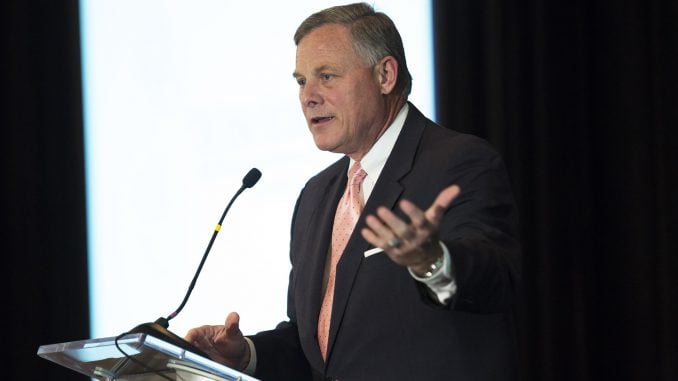
RALEIGH The Jesse Helms Center hosted an event Friday in conjunction with The John William Pope Foundation featuring speakers from North Carolina’s congressional delegation. The all-day event, Foreign Policy And Trade Challenges In The Age Of Trump, attracted policy wonks and conservative donors from across the Old North State as they sought the perspectives of the influential speakers on issues of national security and the direction of U.S. trade policy.”I don’t think that you can talk about national security any longer without talking about homeland security,” said U.S. Sen. Thom Tillis during lunchtime remarks.On the threat of Islamist terrorists, Tillis revealed the extent of threats right here at home based on his conversations with former FBI Director James Comey, while also cautioning against reductions in foreign aid that could hurt diplomatic efforts abroad.”[Comey] said there are 1,000 active investigations for what they consider to be homegrown terrorists, legitimate threats that did not appear to have any nexus with any Middle Eastern or terrorist organizations,” said Tillis. “He then went on to say there’s at least another 1,000 or more that do seem to have their roots in some sort of association or inspiration from the Middle East, and 300 of them are people who came to this country through the refugee program. So we have to recognize that threat is real.”Tillis also cautioned against reductions in foreign aid because it could hurt diplomatic efforts abroad and create more work for our military.”I also believe a very important part of improving our national security posture and our tools is to make sure that we understand that foreign aid is a very important part of those tools,” asserted Tillis. “There are some people … that think we should zero out the foreign aid budget. I will tell you: every general, every admiral, anyone we’ve had come before the Senate Armed Services Committee, when we ask them what they think about that proposition they say, ‘Just make sure you buy me more bullets.'”U.S. Rep. Richard Hudson (N.C.-8), another member of the congressional delegation, spoke of his desire to tackle immigration and border security as part of a larger national security strategy.”The threat is real,” stated Hudson. “Frankly, when ISIS says they’re going to use the refugee program to come here and kill us, I take them at their word. We’re foolish if we don’t.”Our nation’s defense, Hudson said, is also predicated on entirely different issues such as fiscally floundering entitlement programs.”I’m very concerned about the defense budget next year, but I’m really concerned about the defense budget in 10 years when we spend as much on the interest of our national debt as we spend on all of military expenditures,” said Hudson. “Think about that. Or how about in 20 years when we spend as much on interest on the debt as we spend on everything else the federal government spends money on. That’s scary. We’ve got to deal with this national debt issue, and that means Social Security, Medicare, Medicaid. All three programs are on a path to going broke.”On trade policy, Hudson explained his view of President Donald Trump’s “America First” policies within the context of North Carolina industries.”I agree with that notion, but for North Carolina manufacturers and for our agriculture industry here our No. 1 industry in the state we need foreign markets,” said Hudson. “I believe in trade, which I think we as conservatives ought to. I’ve been troubled that over the last several years conservatives in Washington have turned anti-trade, and I think that is not philosophically where we ought to be and I think we’ve got to be very careful about that.”Hudson did say he supports Trump in his opposition to unwieldy, multilateral trade deals like the Trans-Pacific Partnership.”It may be that the future trade in the United States is bilateral trade,” posited Hudson. “Maybe these big deals are too complicated.”The event’s final speaker from North Carolina was U.S. Sen. Richard Burr, who gave his perspective on national security issues from his position as chairman of the Senate Select Committee on Intelligence. Burr said the most frequent question he gets from foreign leaders and intelligence officials is, “Is America going to lead again?” now that Trump has assumed the presidency.”The challenge that we’ve got today is, ‘Can we lead?’ and to recognize the fact that we can’t co-share that position with China and Russia,” said Burr. “I think there was a tendency on the part of the last administration to say, ‘Ya know, let’s rotate this leadership of the world.’ Rotating the leadership does not provide the relationship with our long-standing partners that we have to have to make sure we can police the world, especially when we have the security threats that we do today.”



